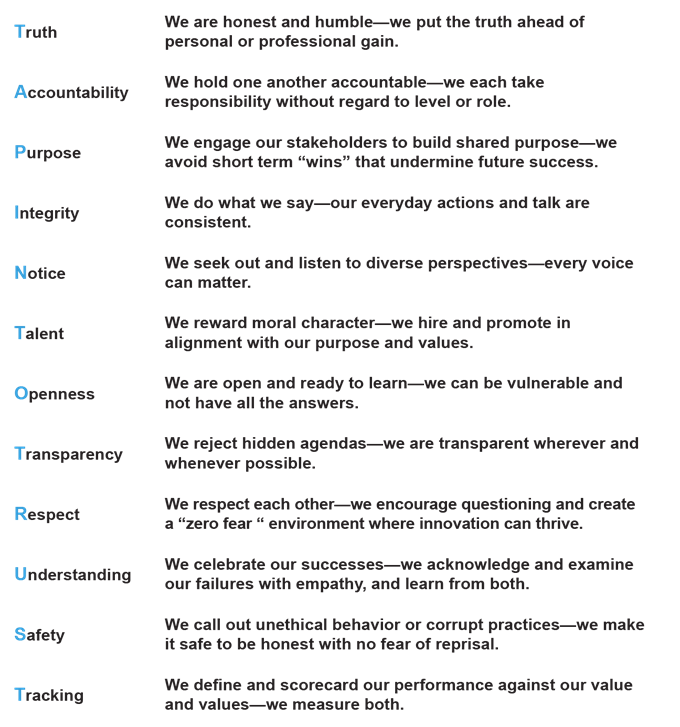In a conversation with the CEO of a public company, one of my colleagues inquired about the role trust plays in his organization. His response mirrored those of his peers over the past 10 years when we first started asking this question: “Trust is very high as evidenced by our quarterly earnings.”
This CEO’s perspective on the impact of trust on corporate culture would make Milton Friedman theorists proud, as it focused solely on his shareholders, to the exclusion of all other stakeholders. For those unfamiliar with Friedman’s theory, it was simply that “the sole responsibility of business is to increase profits.”
Telling quite a different “trust” story is the online employee reviews from that same company:
- Upper management gets a pass as the underlings get the scrutiny.
- Management and HR gossip about employees.
- They instructed me to do things that were not in line with the company handbook. When I would point out the discrepancies they would refer to it as a corporate typo.
- Coworkers were rude and made lewd comments towards the women. They say there is zero tolerance policy for harassment but when a team leader or supervisor is the one doing the harassing it is completely acceptable with the HR department.
- This is a great place to work if you enjoy being miserable and underpaid.
The business case for trust
Speaking in 2016 at an annual conference of the Arthur W. Page Society, Paul Polman, CEO at Unilever noted that without trust in companies, there can be no genuine prosperity. Seventy-five percent of U.S. graduates, he said, do not want to work for big companies anymore.
In today’s rapidly changing business environment, building a trust-based culture should be a top priority of both the Board of Directors and CEO. Why?
The business case for creating a trustworthy culture continues to be made, yet, it is rarely acknowledged let alone implemented. It requires not only leadership acknowledgement but also the acceptance and application of the essential principles upon which a foundation of trust can be built.
Our FACTS® Framework calculates the trustworthiness of US based public companies; we have issued an annual report of our findings since 2012. On average, the “Top 10” most trustworthy public companies have outperformed the S&P 500 by over 30% annually.
Trust Alliance principles
In the summer of 2017, Trust Across America-Trust Around the World’s global Trust Alliance began to develop a set of universal trust-building Principles that could be applied in any organization of any size.
Beginning with almost 90 ideas, and over the course of a year, members weighed-in on the most essential elements and honed the ideas to 12 final principles that form the acronym, “TAP INTO TRUST.” TAP (Trust Alliance Principles) was published in April 2018 and is currently available as a free PDF download in 15 languages. As of August 2018, our movement has attracted over 21,200 global professionals.
Can these principles impact workplace culture?
Absolutely. Let’s start with the first principle — truth. In a high trust culture, employees are not afraid to speak the truth. In fact, they receive positive feedback from leadership for doing so, regardless of the “issue.” This builds two-way trust (and confidence) in both leadership and among team members, as personal and/or professional gains take a back seat.
Applying the principles
We surveyed our TAP steering committee for further input on the impact of TAP on culture. Alain Bolea, a management and leadership advisor, had this to say about TALENT:
What is Talent? Too often, it gets boiled down to skills. And yes, skills are a given. Yet, for an organization to experience ongoing success, it takes more than skills. It requires highly coordinated action which requires a culture of trust — a culture of trust capable of delivering the superior returns on equity well documented by the FACTS Framework.
How does talent show up in a culture of trust? In organizational life, stressful times are an opportunity to gauge the mettle of its people. In difficult moments, talent shows when an individual displays moral character by addressing the higher good rather than a personal agenda; when that individual finds the right word, the right question, the right idea, the right action that embodies the shared values of the organization and inspires others to a solution. Two organizations may have the same skill set, but talent will distinguish the vibrant one from the ho-hum one.
Others commented on the impact of RESPECT on culture:
“Mutual respect is an aspect of trust that greatly enhances a positive workplace culture. Respecting alternative opinions can positively impact one’s company culture as much as discouraging questioning can negatively impact it. A common negative feedback item in leadership development workshops entails publicly embarrassing those who offer a discrepant view. A culture where people respect one another not only drives out fear but it also allows everyone a greater chance to thrive.” — Holly Latty-Mann
“In these turbulent economic, social and political times, organizations need to be flexible and adaptive to survive and thrive. Certainly, change stresses relationships in any organization, but those that build a culture of trust will find that change produces renewed engagement. Respect is key to this kind of culture. Especially in uncertain times, the knowledge and ideas from every level of the organization provide the basis for positive innovation. These organizations can leverage the engagement of their people to see more opportunities and adapt plans to changing circumstances.” — Bart Alexander
When culture and purpose unite
And getting back to Paul Polman, what has he done differently at Unilever that most leaders have yet to do? Very simply, he has evolved the company into one with a culture of PURPOSE.
According to Unilever’s website: “Our Corporate Purpose states that to succeed requires ‘the highest standards of corporate behavior towards everyone we work with, the communities we touch, and the environment on which we have an impact.'”
Doing so requires leadership that is committed to a shared vision transcending beyond the walls of the company itself. When culture and purpose unite, attracting and keeping talented employees is just one of the many positive outcomes. Building trust-based principles into the DNA of an organization elevates security among employees. They spend less time looking over their shoulders and more time engaging, innovating, collaborating and working for the “greater good.” Efficiency increases as decisions are made faster and turnover decreases.
In today’s team-driven business world, building a culture based on trust is one of the most important responsibilities of leaders in all types of organizations, and it’s no longer “just about profits.” While companies may go to great lengths to establish a culture that encourages trust, it falls upon individual leaders to follow through with those intentions and deliver that level of trust to both their internal and external stakeholders.
This article was first published on Human Synergistics.
